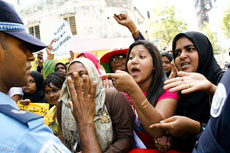While attention in the Maldives focuses on a political crisis which shows no sign of abating, the people are faced with another issue of urgent attention: an increase in the number of child deaths.
Four children under the age of 10 have been reported dead in isolated incidents in just the last few weeks.
The first case was reported on February 19 after a one year-old baby fell from the second-floor balcony of a house in Male’.
A week later, a 10 year old boy was reported dead on the island of Miladhoo in Noonu atoll on February 27. According to local news outlet Sun, the boy had consumed paint thinner (a toxic solvent) while playing around with friends and was subsequently poisoned.
In the first week of March, a two year-old girl was found dead in a fish pond inside a house on Maaamigili in Alifu Dhaalu Atoll, while a six year-old boy was fatally injured after he was hit by a speeding motorbike in a road accident on Gan in Laamu Atoll. The boy went into a coma and died on Thursday night.
Following the death of the boy, the Human Rights Commission of the Maldives (HRCM) released a statement saying that the children deaths had increased recently due to “negligence in providing the necessary protection required by the children”.
Expressing concern over the deaths, the commission had urged the government to identify potential threats to the children in the community and formulate the legal framework to protect the children from harm, and educate parents to minimise such incidents.
Speaking to Minivan News, Police Sub-Inspector Ahmed Shiyam observed that “it is difficult to believe that any mother or father would deliberately neglect the child or cause any harm”.
However, he noted that the way of life has changed drastically over the past years including children’s behavior and playing habits. “Therefore it is necessary to be more attentive to what the children are doing all the time,” Shiyam said.
He noted that police are investigating the reported deaths of children to determine if there was any negligence involved, and will forward the cases to the Prosecutor General’s Office (PG).
“The PG will decided whether to prosecute the cases,” he said.
The deaths come amid the political unrest in the Maldives, which continues to attract almost all of the public’s attention. Cross party peace talks backed by international support have failed to resolve the political stalemate.

